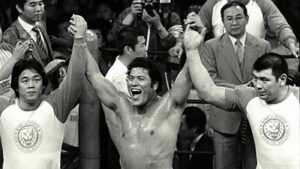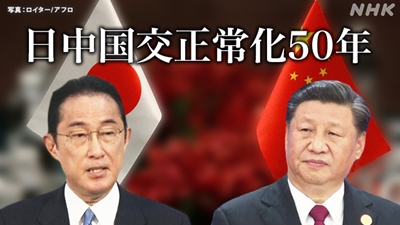
日本と中国は、1972年9月29日の国交正常化から50年を迎えました。節目にもかかわらず、諸問題を抱える中、お祝いモードは影を潜めていました。
➣Thursday marks the 50th anniversary of the normalization of diplomatic relations between Japan and China. But with bilateral ties strained, the mood is far from celebratory.
※be far from~には程遠い、から懸け離れている、決して~ではない
※celebratory祝う、祝賀の
➣Despite the milestone(節目), the ceremony lacked a celebratory mood as the two countries remain at odds over disputed East China Sea islands and China's growing military and economic influence in the region.
※at odds 〔考え方などが〕一致[調和]しないで 不和で、対立して、衝突して、争って、もめて、反目して
➣The atmosphere is subdued rather than festive due to friction over the Senkaku Islands and Taiwan.
※subdued 通常よりも抑えられた、〔活動などが予想よりも〕不活発な
※festive祝祭の、祭日の/はなやいだ、陽気な、浮かれる
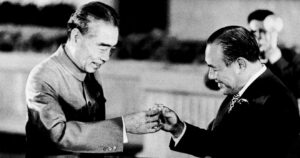
昭和四十七年九月に発表された日中共同声明は、「中華人民共和国政府が中国の唯一の合法政府であることを承認する。」として、台湾が中国の領土の一部であることを確認しています。
➣In line with recognizing the Communist-led People's Republic of China (中華人民共和国) as the "sole legal government" of China, Japan severed diplomatic relations with self-ruled democratic Taiwan, formally called the Republic of China.(中華民国 台湾(Taiwan)の正式名称)
※sever〔関係などを〕断つ、解消する

記念にやってきたのはカンカン&ランラン。空前のパンダブームになります。
➣Tokyo's Ueno Zoo celebrated the arrival of a pair of giant pandas, Kang Kang and his partner, Lan Lan, sparking an unprecedented panda craze in the country.
中国のパンダ貸出外交は、権威主義を和らげるツールだという声が増えています。
➣China loans pandas to zoos and zoos pay fees to keep pandas. Though pandas serve as goodwill ambassadors for China, experts said it is a tool to soften China’s authoritarian image.
※goodwill ambassador親善大使
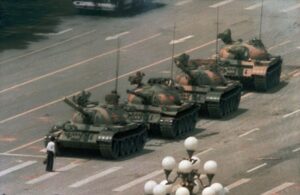
天安門事件は1つの転換点となりました。
➣The 1989 protests in Beijing's Tiananmen Square brought China to a tipping point. Demonstrators, led mostly by students, wanted reform and democracy but the Communist Party cracked down on them.
※tipping point〔重大な変化が起きる〕転換点、転機➾turning point、watershed
天安門事件:Tiananmen Square Incident ⇒Tiananmen Square protests/Tiananmen Square Massacre/crackdown on pro-democracy demonstrators at Tiananmen Square
天安門事件に至るまでの背景(市場開放、海外投資の開始。腐敗、党の分断)について、BBCより
➣In the 1980s, China was going through huge changes. The ruling Communist Party began to allow some private companies and foreign investment. Leader Deng Xiaoping hoped to boost the economy and raise living standards. However, the move brought with it corruption, while at the same time raising hopes for greater political openness. The Communist Party was divided between those urging more rapid change and hardliners wanting to maintain strict state control. In the mid-1980s, student-led protests started.
国交正常化から50年。ODAは総額約3兆6600億円に上り、日中は協力関係⇒競争関係にシフトしました。
タイトル:50 years on, Jap an-China ties shift from cooperation to competition
※__ years on それから_年(後の現在)
➣In 2010, China overtook Japan as the world's second-largest economy.
※overtake=〔前の人や車などを〕追い越す、追い抜く〔競争相手などを〕しのぐ、上回る ➾outstripでもOK
➣China has leapfrogged Japan to become the world's second-largest economy, a title Japan has held for more than 40 years.
※leapfrog〔遊びで〕馬[蛙]跳びをする/〔序列などを〕追い抜く、一足飛びする
➣(外務省のHPより)Official Development Assistance (ODA) to China began in 1979, and ended in March 2022. Total numbers are approximately 3.3165 trillion yen in loan aid (yen loans), 157.6 billion yen in grant aid, and 185.8 billion yen in technical cooperation. (As of FY 2020)
※yean loan円借款 ※grant aid 無償援助、無償資金協力
国際社会は、中国がいずれは民主化するだろうと考え、無尽蔵な援助を続けてきました。
➣China’s disrespect for international norms and human rights standards has shocked the western world. Decades of unhindered economic cooperation with China were based on the assumption that it will eventually democratize.
※unhindered 妨げられない、制限のない
※assumption仮定、前提
益々assertiveにaggressiveになっていく中国と今後どう付き合っていけばいいのかが課題です。
➣Beijing is flexing its military muscle by arming the isles with fighter jets, anti-ship systems, and other military facilities.
➣For a decade, China has waged “gunboat diplomacy” in the South China Sea (SCS) by bullying its maritime neighbors into accepting its territorial claims of “indisputable sovereignty” and control over 90 percent of the sea.
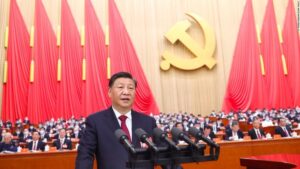
10月16日、共産党大会が開かれ、習近平は国内においての地位を堅固にしようとしています。
➣China’s ruling Communist Party held its five-yearly congress beginning on Oct. 16, with Xi Jinping poised to secure a historic third leadership term and cement his place as the country’s most powerful leader since Mao Zedong.


